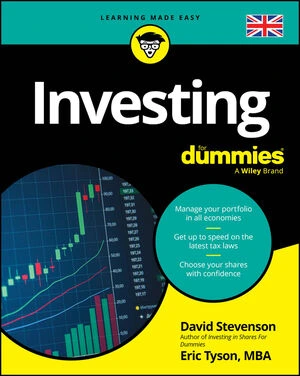Stocks, bonds, mutual funds, exchange-traded funds, and property — the allure of earning high returns from these investments gets people’s attention. However, people also hear about the risks involved in chasing those greater potential returns when investing.
Before you set out to invest, you must get your financial house in order and increase your knowledge to make your best investing decisions. The following list summarizes 20 key themes and actions that can help make you a successful investor.

© ITTIGallery / Shutterstock.com
20 rules for successful investing
- Saving is a prerequisite to investing. Unless you have wealthy, benevolent relatives, living within your means and saving money are prerequisites to investing and building wealth.
- Know the three best wealth-building investments. People of all economic means make their money grow in ownership assets — stocks and property — where you share in the success and profitability of the asset.
- Be realistic about expected returns. Over the long term, 9 to 10 percent per year is about right for ownership investments (such as stocks and property).
- Think long term. Because ownership investments are riskier (more volatile), you must keep a long-term perspective when investing in them. Don’t invest money in such investments unless you plan to hold them for a minimum of five years, and preferably a decade or longer.
- Match your time frame to the investment. Selecting good investments for yourself involves matching the time frame you have to the riskiness of the investment. For example, for money that you expect to use within the next year, focus on savings accounts. Invest your longer-term money mostly in wealth-building investments.
- Diversify. Diversification is a powerful investment concept that helps you to reduce the risk of holding more aggressive investments. Diversifying simply means that you should hold a variety of investments that don’t move in tandem in different market environments. For example, if you invest in stocks, invest worldwide, not just in the UK market. You can further diversify by investing in property.
- Look at the big picture first. Understand your overall financial situation and how wise investments fit within it. Before you invest, examine your debt obligations, tax situation, ability to fund pension accounts, and insurance coverage.
- Don't sweat the small stuff. Ignore the minutiae. Don’t feel mystified by or feel the need to follow the short-term gyrations of the financial markets. Ultimately, the prices of stocks, bonds, and other financial instruments are determined by supply and demand, which are influenced by thousands of external issues and millions of investors’ expectations and fears.
- Allocate your assets. How you divvy up your money among major investments greatly determines your returns. The younger you are and the more money you earmark for the long term, the greater the percentage you should devote to ownership investments.
- Do your homework before you invest. You work hard for your money, and buying and selling investments costs you money. Investing isn’t a field where acting first and asking questions later works well. Never buy an investment based on an advertisement or a salesperson’s solicitation of you.
- Keep an eye on taxes. Take advantage of tax-efficient investment accounts and understand the impact of your tax rate when investing outside of pensions and ISAs.
- Consider the value of your time and your investing skills and desires. Investing in sham and other securities via the best funds and ETFs (exchange-traded funds) is both time-efficient and profitable. Property is the most time-intensive investment.
- Where possible, minimize fees. The more you pay in commissions and management fees on your investments, the greater the drag on your returns. And don’t fall prey to the thinking that “you get what you pay for.”
- Don’t expect to beat the market. If you have the right skills and interest, your ability to do better than the investing averages is greater with real estate and small business than with stock market investing. The large number of full-time, experienced stock market professionals makes it next to impossible for you to choose individual stocks that will consistently beat a relevant market average over an extended time period.
- Don’t bail when things look bleak. The hardest time, psychologically, to hold on to your investments is when they’re down. Even the best investments go through depressed periods, which is the worst possible time to sell. Don’t sell when there’s a sale going on; if anything, consider buying more.
- Ignore soothsayers and prognosticators. In the world of investing, don't trust anyone to have ESP! Predicting the future is nearly impossible. Select and hold good investments for the long term. Don’t try to time when to be in or out of a particular investment.
- Minimize your trading. The more you trade, the more likely you are to make mistakes. You also get hit with increased transaction costs.
- Hire advisors carefully. Before you hire investing help, first educate yourself so you can better evaluate the competence of those you may hire. Beware of conflicts of interest when you consider advisors to hire.
- You are what you read and listen to. Don’t pollute your mind with bad investing strategies and philosophies. The quality of what you read and listen to is far more important than the quantity. Find out how to evaluate the quality of what you read and hear.
- Your personal life and health are the highest-return, lowest-risk investments. They’re far more important than the size of your financial portfolio. Make sure to "invest" in them as well!





